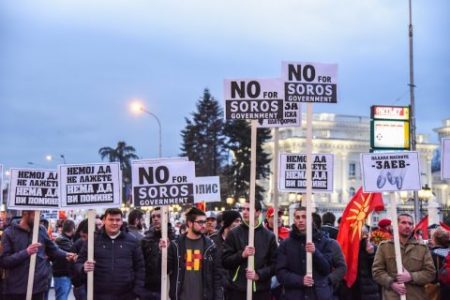Who’s the Man? (With the Master Plan)
How populists use Soros to legitimise their fight

Budapest Metro Station (Voanews)
Every country has some legendary characters from fairy tales, or the ones grandmothers used to tell their grandchildren about. In the world of politics, one can notice how the character of 87-year old George Soros is a provocation for populists of all kinds. Whether it is the collapse of the British Pound or the non-governmental organisations in Macedonia, George Soros is always around to be blamed. The most recent occasion was the news that George Soros is financing campaigns in the UK to stop Brexit. This came as a welcome bulletin for the likes of Nigel Farage, who used the opportunity to deliver a classical populist statement that a rich globalist is behind the anti-Brexit campaign, trying to reverse the will of the people.
It is of course legitimate for the rich and famous to donate or support causes they believe in, but this case is something completely different. George Soros, a Jew that barely survived the Second World War, is valued around 8 billion dollars, and is not your average billionaire. Online figures show that he spent most (Around 18 billion) of his fortune protecting free speech, democracy and the rule of law in various countries. Of course, I am not an expert or biographer of the man, but I believe the attacks on Soros have strong roots in the 1990s.
At the beginning of the 1990s, the UK was struck with something that was named “Black Wednesday”, a day when the UK Pound had to be withdrawn from the European Exchange Rate Mechanism. It was such a massive crush for the UK that the Tory party, under John Major, never recovered from it and it basically paved the way for Tony Blair and his New Labour. Back then, many blamed Soros and his speculative business with the Pound for this disaster. Even nowadays, there are articles online that discuss “how Soros broke the Bank of England”. Around the same time, Central and Eastern European countries were becoming independent or were separating from communism, so new and progressive societies needed to be built.
It was not coincidental that Soros formed the Open Society Foundation, inspired by the name from Karl Popper’s famous work. Soros started to massively invest in the countries of Central and Eastern Europe, before moving later on to areas such as Central Asia. He aimed to finance a variety of things, from publications, NGOs and oppositional movements, to prospective students that would return afterwards to their native countries. Of course, this has not been welcomed by everyone, and was regularly attacked by politicians, especially from the right-wing, who feared foreign or any kind of interference in their plans. In some countries, civil society activists were labelled with derogatory terms that included Soros.
However, as retro is back not only in fashion, what we thought was a product of the 1990s is now alive and kicking. Probably the best-known example is Hungary, Soros’ native land. Soros opened up his Central European University in Budapest (initially in Prague), the heart of Central Europe and a symbol of breaking with the communist past. However, he did not expect that he would be oppressed by a man who was his scholarship recipient back in the 1980s. The story is well-known, so are the hideous adverts on Budapest’s streets and metros. Another recent example is Macedonia, where a right-wing government, which is now in opposition after losing the elections through serious accusations of corruption and misbehaviour, managed to pull the last straw and blame Soros for helping the opposition.
Of course, small-town forces like the ones in Macedonia are aware that Soros does not respond to these remarks and that it is easier to attack him than, for instance, a strong Western power. They can basically get away with it. Unfortunately, the attacks against George Soros remain as some of the most brutal, with strong anti-Semitic and anti-migrant tones. For more than 20 years, from Warsaw to Skopje, Mr. Soros has been viciously used as a tool to mobilise hatred. He also remains the main man for conspiracy theories, ranging from alt-right lunacies to shady-funded media outlets, which consistently refer to him as a mastermind of all the street protests, organised actions or just plain movements against their favourites. Sadly, despite having or lacking sympathies for Mr. Soros, these attacks show us that the political culture in many countries is still not at a satisfactory level, and in Europe it seems to have deteriorated. That has to sound the alarm, otherwise tomorrow someone else will be the one to blame.

Right-wing protests in Macedonia (Kurir.mk)
